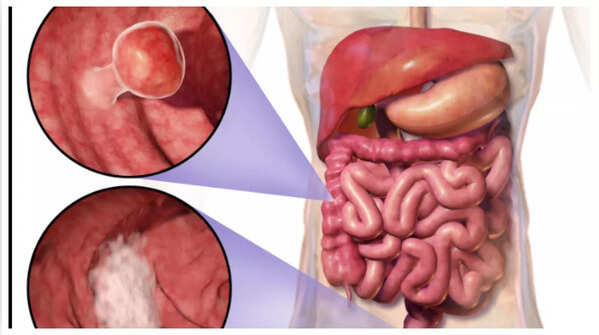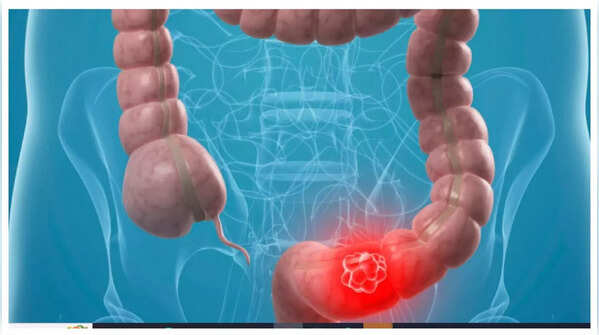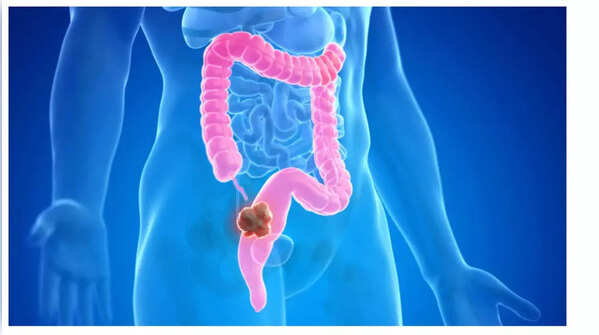Colon cancer, also known as colorectal cancer, originates in the colon or rectum, the final section of the large intestine. It frequently begins as benign cell clusters called polyps, which can transform into cancerous growths over time. While most cases arise spontaneously, factors such as family history, obesity, and lifestyle can elevate the risk. Predominantly affecting individuals over 50, early symptoms are often subtle and mistaken for common digestive issues. However, certain warning signs warrant attention.

A significant early indicator of colon cancer is a change in bowel habits, characterized by:
While these changes may appear insignificant or transient, often attributed to dietary factors, stress, or infections, persistent bowel irregularities lasting more than a few days could signal colon cancer. Such changes may indicate a growing tumor disrupting normal bowel function.

The presence of blood in stool should never be dismissed. It can manifest as:
In some instances, bleeding may be microscopic, leading to anemia over time. Although various conditions, such as hemorrhoids or infections, can cause blood in the stool, it is essential to rule out colon cancer, particularly if it recurs or is accompanied by other symptoms.

Persistent abdominal discomfort is another early symptom that people frequently overlook. This can include:
Often mistaken for indigestion or minor digestive issues like constipation, ongoing pain unrelated to diet or lifestyle changes could indicate a tumor causing irritation or blockage in the colon.

Unexplained and excessive tiredness or weakness can be a subtle indicator of colon cancer, especially when coupled with other factors. Slow, unnoticed bleeding in the colon can result in iron deficiency anemia. The body's reduced red blood cell count impairs oxygen transport, leading to fatigue, shortness of breath, and weakness. Although these symptoms may be attributed to stress or lack of sleep, further investigation is warranted.

Unexplained weight loss is a common symptom in most cancers, including colon cancer. When the body battles cancer, the immune system works overtime, and tumors can disrupt digestion and appetite. Significant weight loss without dietary or exercise modifications necessitates medical consultation, as it can be an early warning sign.
Disclaimer: This information is intended for educational purposes only and does not substitute professional medical advice. Consult with a healthcare provider for any health concerns.

Maintaining a well-balanced and nutritious diet is crucial for overall health.

If you experience any of these symptoms, it's important not to ignore them.

A cancer diagnosis profoundly affects a person's mental state, triggering a range of intense emotions. Shock, disbelief, and overwhelm are common initial reactions as individuals grapple with the life-altering news and future uncertainty. This can quickly evolve into significant fear and anxiety regarding treatment, potential pain, side effects, body image changes, financial burdens, and mortality.

Consult a doctor if you experience any of these symptoms. Do not wait for them to worsen.

Regular exercise can help prevent many ailments, including cancer.

Make sure you do not ignore these symptoms.

If you observe these signs, talk to a doctor.

Do not ignore these signs.

Identify the symptoms before it's too late.
Newer articles
Older articles
 Rishabh Pant: Greg Chappell Hails India Star as Cricket Revolutionary
Rishabh Pant: Greg Chappell Hails India Star as Cricket Revolutionary
 Shadman Islam Backs Bangladesh Batters Despite Day 1 Setbacks Against Sri Lanka
Shadman Islam Backs Bangladesh Batters Despite Day 1 Setbacks Against Sri Lanka
 Bumrah Boosts India's Hopes: Star Pacer Returns to Bowling Drills Ahead of Edgbaston Test
Bumrah Boosts India's Hopes: Star Pacer Returns to Bowling Drills Ahead of Edgbaston Test
 Black Caps Set for Blockbuster Home Summer Against Cricket Giants
Black Caps Set for Blockbuster Home Summer Against Cricket Giants
 Harshit Rana Released from India's Test Squad Ahead of Second England Clash
Harshit Rana Released from India's Test Squad Ahead of Second England Clash
 Hydration Habits Could Significantly Cut Hypertension, Heart Failure Risk, Study Finds
Hydration Habits Could Significantly Cut Hypertension, Heart Failure Risk, Study Finds
 Prasidh Krishna Vows to Sharpen Bowling Accuracy After Expensive Spell
Prasidh Krishna Vows to Sharpen Bowling Accuracy After Expensive Spell
 Gavaskar Calls for Kuldeep Yadav's Inclusion in Second Test Amid Bumrah Fitness Concerns
Gavaskar Calls for Kuldeep Yadav's Inclusion in Second Test Amid Bumrah Fitness Concerns
 Mirabai Chanu Reveals Relentless Training Demands, Weight Concerns Impact Family Time
Mirabai Chanu Reveals Relentless Training Demands, Weight Concerns Impact Family Time
 India's Fielding Blunders Under Scrutiny After First Test Loss to England
or
Ex-Selector Blasts India's Costly Dropped Catches in England Test Defeat
India's Fielding Blunders Under Scrutiny After First Test Loss to England
or
Ex-Selector Blasts India's Costly Dropped Catches in England Test Defeat